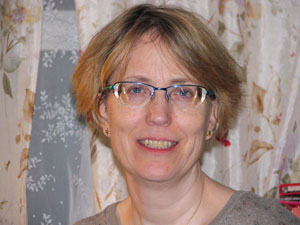Ovarian Cancer Survivor
Teacher Learns How Precious Life Is
 Carol Tsang holds a Ph.D. in History and East Asian Languages from Harvard University. She is also the author of a book about a militant Buddhist sect in 16th century Japan titled War and Faith (Harvard East Asia Center, 2007). Tsang and her husband Jim live in White Plains, New York, where Carol volunteers regularly at Gilda’s Club Westchester.
Carol Tsang holds a Ph.D. in History and East Asian Languages from Harvard University. She is also the author of a book about a militant Buddhist sect in 16th century Japan titled War and Faith (Harvard East Asia Center, 2007). Tsang and her husband Jim live in White Plains, New York, where Carol volunteers regularly at Gilda’s Club Westchester.
In the spring of 2000, I began having abnormal vaginal bleeding after intercourse. At first I thought it was just a little staining, but after a few months I realized it needed to be looked into, and I went to my gynecologist. In August, after an ultrasound indicated something unusual going on in my uterus, an endometrial biopsy showed that I had “hyperplasia without atypia” (a non-cancerous overgrowth of the uterine lining). But the doctor wanted to investigate further and performed a D&C (dilation and curettage) and hysteroscopy. Those tests showed I had hyperplasia with atypia, a precancerous condition. The gynecologist said that my condition was non-invasive cancer, but that there might also be invasive cancer, and we wouldn’t know that without a hysterectomy.
I consulted a gynecologic oncologist who agreed that I needed a hysterectomy, and I had the surgery on September 29. During the operation they found a tumor on my left ovary. It turned out that the good news was that I did not have invasive endometrial cancer. The bad news was that I did have invasive ovarian cancer, and the doctors said I’d have to have further surgery to determine the stage. For many weeks I didn’t know how bad the ovarian cancer was; I didn’t know if I’d even be alive in a year. It was terrifying.
During this whole time, people kept saying I was lucky because if I hadn’t had the hysterectomy the doctors wouldn’t have discovered the ovarian cancer until it was much more advanced. I certainly didn’t feel very lucky to have two cancers!
Eventually, my ovarian cancer was diagnosed as stage I invasive cancer, a not very aggressive cancer. The doctors assured me that chemotherapy wasn’t necessary. In a way, I wanted chemotherapy because I was still afraid, no matter how early they insisted the ovarian cancer was. In fact, however, the doctors said it would be more dangerous to have chemo than not because it would increase my chances of developing leukemia later. By December 2000, I was finished with treatment.
During this time, what helped me most, aside from my husband Jim, was the doctor who performed my hysterectomy. He was very caring and allotted plenty of time to answer my questions. He kept scheduling me for double appointments, to make sure he did not need to rush. The more I understood, the better I felt because at least things weren’t happening without my knowledge. The most difficult part of the experience for me was realizing that I had no control over what was going on inside my body.
The other part of what helped me most was the support I was able to find from other cancer survivors. I love my wonderful friends, but they could not understand a lot of what I was going through. Only after I found a support group of survivors could I get the help of talking, being understood and — this is important — being able to help others by talking and understanding.
Cancer changed my life. It sounds like a cliché, but I really learned how precious life is. I also learned that I could deal with more than I thought I could. I lost my teaching job in 2003, partly because I wasn’t able to write and publish anything during my cancer diagnosis and treatment, or indeed for a while afterwards. It takes time to get over an experience like that, and to learn to live with the knowledge that so much of what is most important to you — your very life and death — can be so completely out of your control. But even though losing a job is a terrible thing, in the grand scheme of things it’s not so bad — at least it’s not cancer!
My relationship with Jim is good. He’s as grateful as I am that it wasn’t worse, and that I’m still with him. My message to anyone who’s diagnosed with cancer? Hang in there and never lose hope.


